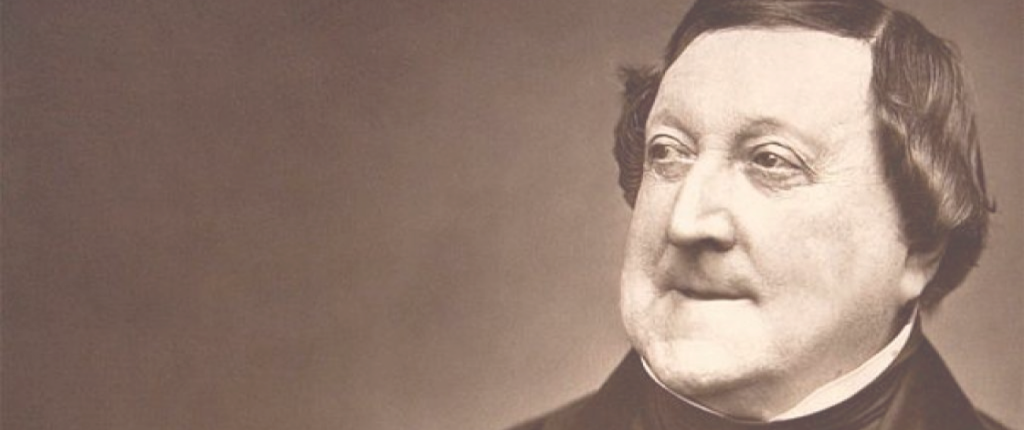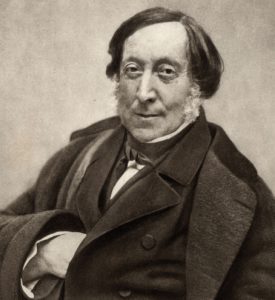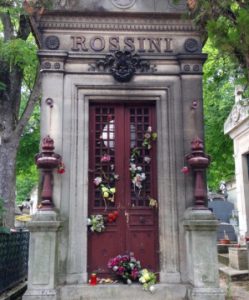6 Interesting Facts About Rossini, The Leap Year Composer

Rossini. The name alone evokes a sense of excitement in me. His William Tell Overture is one of those pieces that stuck by me from the first moment I heard it, now well over 30 years ago.
I’ve played his music, listened to his music, arranged his music, conducted his music and visited his grave. Today, on the 29th February, it’s his birthday. As such, I think it is fitting to introduce a few facts about this “leap year” composer that you may not know.
I hope you enjoy learning a little about this marvellous composer.
 Rossini was born on the 29th February 1792. He was known to be very superstitious and ironic about the fact he was born on that day, and he really only celebrated his birthday every 4 years. When he turned 76, in 1868, he invited his friends to celebrate his 19th birthday, only a few months before he died. Rossini died on a Friday the 13th. Talk about “bad luck”…
Rossini was born on the 29th February 1792. He was known to be very superstitious and ironic about the fact he was born on that day, and he really only celebrated his birthday every 4 years. When he turned 76, in 1868, he invited his friends to celebrate his 19th birthday, only a few months before he died. Rossini died on a Friday the 13th. Talk about “bad luck”…
If you were to count his “actual” birthdays, he’d be 57 today, on the 29th February 2020!
 Rossini died in Paris, and that is where he was buried. His very impressive tomb is situated in the famous Père Lachaise cemetery, alongside other notable figures, such as Chopin, Molière and Oscar Wilde.
Rossini died in Paris, and that is where he was buried. His very impressive tomb is situated in the famous Père Lachaise cemetery, alongside other notable figures, such as Chopin, Molière and Oscar Wilde.
It may seem a little morbid, but this cemetery is a fascinating place to visit. However, while you can see Rossini’s tomb, you won’t actually find Rossini’s remains there. At the request of his wife, they were relocated to the Santa Croce church in Florence, Italy.
Beethoven is another one of my all-time favourite composers. I love his honesty, vivacious nature and incredible music. He assessed Rossini as follows:
Rossini would have been a great composer if his teacher had spanked him enough on the backside.
I’m not sure what he meant by that. I think Rossini wrote excellent music. Perhaps Beethoven didn’t feel the same way…
In 1822, Rossini met Beethoven. Beethoven was aged 51, profoundly deaf and in failing health. The two communicated in writing, and Beethoven is alleged to have said the following:
Ah, Rossini. So you’re the composer of The Barber of Seville. I congratulate you. It will be played as long as Italian opera exists. Never try to write anything else but opera buffa; any other style would do violence to your nature.
Beethoven was right; it is still being played regularly. But what harsh criticism! Do you think it was deserved or not? Leave your comments below!
Rossini died in 1868. His second wife, Olympe, inherited most of his wealth. When she passed, this money was used to open a music conservatorium in Pesaro (Rossini’s birthplace in Italy) and a home for retired opera singers in Paris.
This really reminds me of the 2012 movie Quartet. Have you seen it? It tells the tale of the life in a home for retired musicians. It features Maggie Smith, Billy Connolly, Michael Gambon and many others. I highly recommend this movie; it is clever, funny, musical and dramatic at times. The trailer is available on YouTube and you can rent it there for a very low fee as well.
Rossini is very well known to have been a real gourmand. He loved foie gras and truffles. His love for food inspired dishes such as Tournedos Rossini.
When Rossini moved to Paris, he became close friends with the great chef Antonin Carême. The chef dedicated recipes to Rossini, and in turn, Rossini wrote a short song, piece or aria for him. These short works are now known as the Péchés de vieillesse (Sins of Old Age). One of these is a short piano work dedicated to some of his favourite tasty treats. Have a listen to his Quatre Mendiants (dedicated to figs, almonds, raisins and hazelnuts) and his Quatre Hors d’Oeuvres (dedicated to radishes, anchovies, cornichons and butter).
We know Rossini particularly for his operas. He wrote the bulk of his operas in just 10 years. Rossini composed 30 of his 39 operas between 1812 and 1822. His last opera is one of the most famous ones. He wrote it in 1829 and it became known as William Tell.
A little bit more about William Tell
The opera is rather long (4 hours) and has large casting requirements. As such, it is quite difficult to produce the work. For that reason, the opera is often cut in favour of the very famous overture, which is played regularly by symphony orchestras around the world. The high-energy finale is very familiar through its regular use in tv shows.
The overture has 4 parts:
- The cello section features in the first part, the Prelude. It is slow and very lyrical, and it reminds me of a beautiful sunrise.
- The Storm is a very boisterous section. The full orchestra plays in this part.
- The Call to the Dairy Cows features a beautiful solo by the cor anglais, accompanied by the flute.
- The March of the Swiss Soldiers is the most famous section of the work. It is a very dynamic galop in which the trumpets and trombones play a major role. It is played by the full orchestra to bring this wonderful work to a majestic close.
In my opinion, Rossini was a genuis, no matter what Beethoven thought! I personally continue to enjoy his music, year after year. This is the end of this blog post, but I can’t not share a recording of the William Tell Overture.
In the comments below, please share your experience with Rossini’s music. Have you ever played his music? Which of his works “stick” with you and why? Feel free to share, I’d love to read about it all.
Happy 57th birthday, Gioachino!




